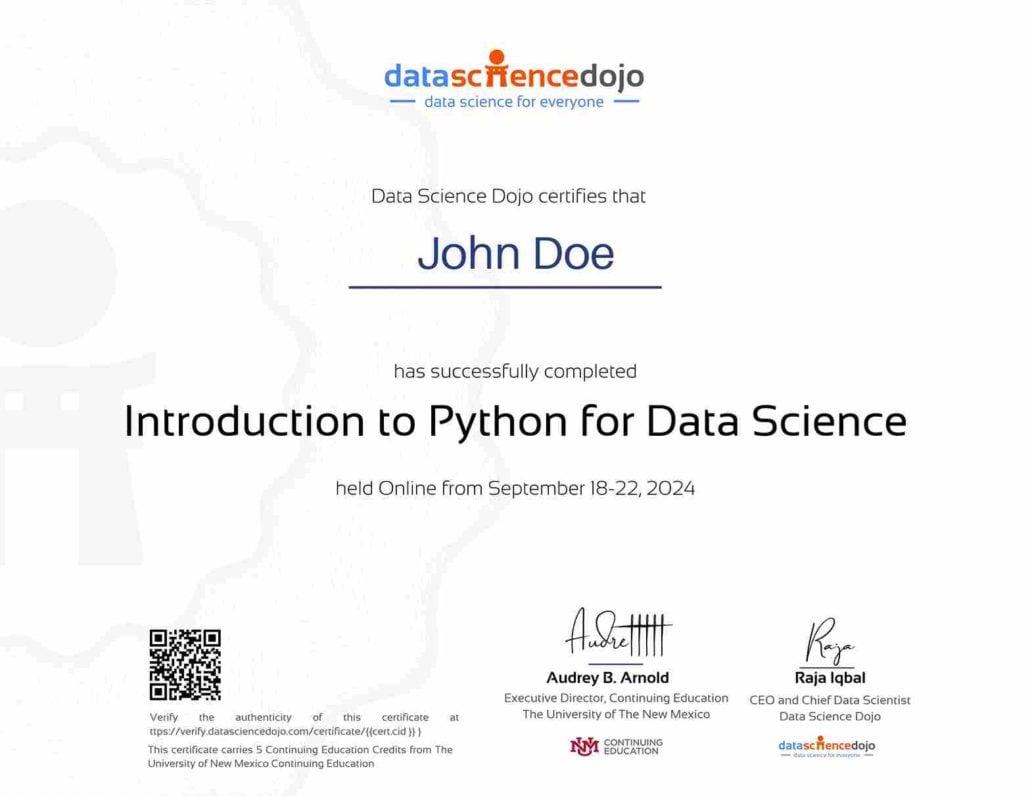Introduction to Python for Data Science
- Learn to use Python effectively for data analysis, machine learning and data engineering
- Data Loading, Storage, and File Formats
- Data Wrangling: Cleaning, Transforming, Merging and Reshaping
- Data Exploration and Visualization
- Data Pipelines and Data Engineering
- Machine Learning in Python
- Test Your Skills: Complete a Python Project



No technical skills required
We have meticulously crafted our Python for Data Science and Data Engineering course to provide a comprehensive and hands-on learning experience. Covering Python fundamentals, data wrangling, exploration, visualization, machine learning, and more, this curriculum is the most extensive short-duration program designed for data scientists, data engineers, analysts, and researchers.
Our program is tailored for both practitioners and beginners, offering a blend of self-paced learning modules and in-person training. Whether you’re new to Python or need a refresher on syntax, our pre-training modules ensure you’re well-prepared before the live sessions.
Curriculum
A practical guide to data science and machine learning—covering data handling, transformation, visualization, automation, predictive modeling, and beyond.
Data Loading, Storage, and File Formats
Data Wrangling: Cleaning, Transforming, Merging and Reshaping
Data Exploration and Visualization
Data Pipelines and Data Engineering
Machine Learning in Python
Python Project
More than just a course
Our python for data science bootcamp is not just a training program; it’s a gateway to mastering python, with a variety of resources to support your learning journey.
Access hundreds of coding exercises, sandboxes, free tutorials and other bonus learning material.
Just bring a laptop
Watch tutorials or practice coding in browser-based Jupyter notebooks and inline code runners. We call our learning platform a complete learning ecosystem.
Personal coding sandboxes
Every attendee gets a dedicated compute and storage pre-configured with relevant libraries and packages.
100s of code samples
In addition to the in-class exercises, attendees receive Python and R code samples that have been pre-tested.
No subscriptions needed
All software licenses, subscriptions, tools, and computing resources are included.
Cohort discussion forum
Get help from course staff, share ideas and discuss with your peers.
Free courses
Dozens of other short courses and coding exercises are included in the registration.
Exclusive alumni community
Join the exclusive community of 11,000+ alumni globally. Discuss, collaborate, and expand your network.
Trusted by Leading Companies
Recommended by Practitioners
At the end of the bootcamp I think all of us are at the same place, so that’s the beauty of this program. You could come from any background because we are covering some diverse topics here, and making sure it’s a level playing field and again, going back to to the motto of, hey, this is for everyone. Kapil Pandey, Analytics Manager at Samsung
It was a great experience for increasing the expertise on data science. The abstract concepts were explained well and always focused on real applications and business cases. The pace was adjusted as needed to let everyone follow the topics. Week was intense as there are many topics to cover but schedule was well managed to optimize people attention.Harris Thamby, Manager at Microsoft
What I enjoyed most about the Data Science Dojo bootcamp was the enthusiasm for data science from the instructors.Eldon Prince, Senior Principal Data Scientist at DELL
Highly valuable course condensed into a single week. Enough background is given to allow one to continue their learning and training on their own.Good energy from the instructors. It is clear that they have real industry experience working on problems.Ben Gawiser, Software Engineer at Amazon
I’m really impressed by the quality of the bootcamp, I came with high expectation and Data Science Dojo exceeded it. I highly recommend the bootcamp to anyone interested in Data Science!Marcello Azambuja, Engineering Manager at Uber
With the knowledge I’ve gained from this bootcamp I can further add value to my clients. Data Science Dojo is the only training which provides alot of useful content and now I can confidently make a predictive model in few minutes.Iyinola Abosede-Brown, Senior Technology Consultant at KPMG
Future proof your career
Coming Soon !
Learn Python for data science from leading experts in industry.
Start Learning
Use PYDS500 for USD 500 discount.-
Learn from industry experts through live session
-
Get 1-year access to dedicated learner sandboxes.
-
Access to exclusive Python coding labs.
-
Access all session recordings.
-
Get a verified certificate
Related Courses

in-person & Online | 40 hours | 5 days
Large Language Models Bootcamp
A comprehensive introduction to building generative AI and large language models applications. Designed for anyone who wants to build large language models applications. Learn more

Online | 30 hours | 8 WEEKS
Agentic AI Bootcamp
Learn to build agents, not just apps. Automate reasoning, planning, context retrieval and execution.Learn to build and evaluate Agentic models, tune model hyper parameters. Hundreds of practical exercises and capstone project. Learn more

Online | 70 hours | 16 weeks
Data Science and Data Engineering Bootcamp
The longest running data science bootcamp in industry. Learn to build and evaluate machine learning models, tune model hyper parameters. Hundreds of practical exercises and capstone project. Learn more

Online | 8 hours | 1 day
Large Language Models for Everyone
Large language models course is designed for anyone interested in getting started with large language models and generative AI without all the math and programming. Learn more
Earn a Verified Certificate
Earn a verified certificate from The University of New Mexico Continuing Education:
- 2 Continuing Education Credit (CEU)
- Acceptable by employers for reimbursements
- Valid for professional licensing renewal
- Verifiable by The University of New Mexico Registrar’s office
- Add to LinkedIn and share with your network

Attend the Python for Data Science Bootcamp for free
We Accept Tuition Benefits
All of our programs are backed by a certificate from The University of New Mexico, Continuing Education. This means that you may be eligible to attend the bootcamp for FREE.
Not sure? Fill out the form so we can help.
Frequently Asked Questions
How long do I have access to the program content?
Access to the program content depends on the plan you choose at the time of registration. Learn more about different plans here.
What is the duration of the program?
Introduction to Python for Data Science program is 5 days, 3 hours per day, for a total of 15 hours of training. There is additional practice if you would like to keep refining your python skills after the program ends.
Are there any prerequisites for this program?
There are no prerequisites for this program, however our pre-course prep work will include tutorials on fundamental concepts of data science and Python programming to help you prepare for the training program.
Are classes taught live or self-paced?
Classes are live and instructor-led. Office hours will be available multiple times a week in case students need assistance. The program is not self-paced but we do assign some homework and practical exercises to further facilitate your learning. Lectures will also be recorded to give students the option to go back and review.
What is the cost of the program?
The cost will depend on the plan purchased by the students and the discounts available at the time. Please contact us at [email protected] for updated information on discount availability and payment plans.
If I have questions during the live instructor-led sessions or while working on homework?
Yes, our live instructor-led sessions are highly interactive. Students are encouraged to ask questions, and our instructors make sure to provide thorough responses without rushing. Additionally, discussions relevant to the topic being taught are actively encouraged. We also understand that questions may arise during homework. To support you, we have a dedicated Discord community where you can receive help from our instructors and connect with fellow students.
What different plans are available?
We’re offering three different plans for this program.
Dojo. With the Dojo plan, you will get 15 hours of live training, pre-training material, program content, and restricted access to Jupyter notebooks.
Guru. With the Guru plan, you will get everything in the Dojo plan including bonus Jupyter notebooks during the program, access to the learning platform during the program, access to collaboration forum, recorded live sessions, and a verified data science certificate from the University of New Mexico worth 2 Continuing Education Credits.
Sensei. With the Sensei plan, you will get everything included in the Guru plan with the additions of one year of access to the learning platform, Jupyter notebooks, collaboration forums, recorded sessions and office hours, and live support during the program.
Are there any discounts?
Yes, we are offering an early-bird discount on all three plans.
How much time will class + homework take?
The class will be 3 hours per day and you can expect 1-2 hours of homework every night. Our instructors and teaching assistants will be available during office hours Monday-Thursday for additional help.
How do I register for the program?
To register for the program, simply view our packages and register for the upcoming cohort. The payment can be made online on our website, via invoice, or wire transfer.
How do I access the learning portal?
Once you are registered for the program, you will receive a few emails from us. One of those emails will contain steps to create your learning portal account and access the program content. Please follow the steps in the email to create your account. If you’re facing any difficulty please email us at [email protected] for assistance.
What is the transfer policy?
Transfers are allowed once with no penalty. Transfers requested more than once will incur a $200 processing fee.
What is the refund policy?
If for any reason, you decide to cancel, we will gladly refund your registration fee in full if notified the Monday prior to the start of the training. We would also be happy to transfer your registration to another bootcamp or workshop. Refunds cannot be processed if you have transferred to a different bootcamp after registration.
OUR OTHER OFFERINGS
Get In Touch
Connect With Us
Future proof your career
Reserve your spot
Learn to build agentic AI applications from leading experts in industry.
Upcoming Cohorts
July Cohort
- Tuesdays, 9am – 12pm PT
- Eight weeks, starting July 15th
August Cohort
- Thursdays, 5pm – 8pm PT
- Eight weeks, starting August 28th
Start Learning
Use SUM500 for USD 500 discount.-
Learn from industry experts through live session
-
Get 1-year access to dedicated learner sandboxes.
-
Access to exclusive Agentic AI coding labs.
-
Access all session recordings.
-
Get a verified certificate






